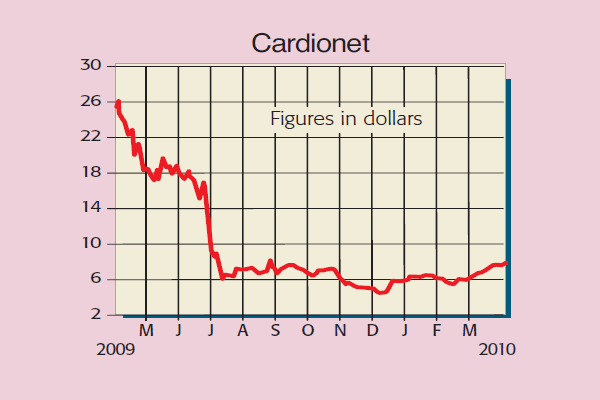
One winner from President Obama’s $938bn Healthcare Reform Bill will be telemedicine – the remote monitoring, diagnosis and treatment of medical conditions. The nascent technology not only provides clinical benefits at substantially lower cost, but also frees up vital hospital beds at a time when another 32 million Americans (10% of the population) need to be absorbed into the system.
That’s good news for Cardionet, the number-one provider of wireless recording services for patients with abnormal heart rhythms. This recurrent condition affects four million people in the US, and causes 780,000 hospitalisations and 480,000 deaths annually.
Its patented and FDA-approved Mobile Cardiac Outpatient Telemetry (MCOT) machine is three times more successful at diagnosing heart problems than competing technologies. So early action can be taken before more serious problems occur. More than 300,000 people have used the service since its launch, which underlines its clinical (and financial) advantages.
Cardionet (Nasdaq: BEAT)
So why has the share price dropped like stone from over $28 last April? Well, the whole sector received a body blow last July, when government health insurer Medicare announced it was slashing reimbursement rates by 33% from $1,123 to $753 per person. Since most of Cardionet’s contracts with other customers were priced on similar commercial terms, the firm was sent into the red in one hit. Yet this wound should not prove fatal. Costs are being cut, and the business is set to return to profitability by the end of 2010.
Meanwhile, patient volumes are forecast to soar 35% this year to 154,000. Furthermore, there are excellent opportunities to deploy the same innovative technology more widely. I also suspect that when existing contracts come up for renewal, the board will ensure that future pricing mechanisms are designed to reduce the firm’s reliance on just one reimbursement rate.
Wall Street is expecting sales of $137m and $152m for the next two years. These figures look easily achievable, given the huge potential for the business. I reckon that Cardionet could achieve sales and underlying EPS of $500m and $2 per share by 2015, once it has renegotiated commercial terms and started to branch out internationally.
So, after adjusting for net cash of $49m, applying a 14 times p/e multiple and discounting back at 15%, my fair value for the company is roughly $14 per share. Investors face the usual dangers associated with pioneer stocks. These include increasing competition, losses and heavy dependency on one product and customer. However, given the undoubted success of MCOT, Cardionet looks an exciting play on the future health of telemedicine.
Recommendation: SPECULATIVE BUY at $8.45
• Paul Hill also writes a weekly share-tipping newsletter, Precision Guided Investments